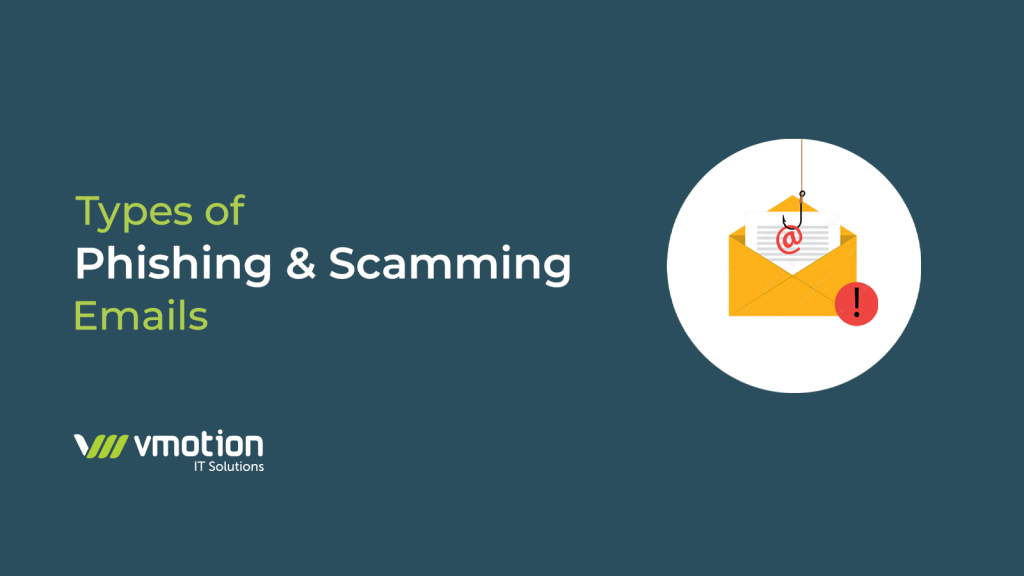As technology has advanced, cybercriminals have also become more sophisticated in their methods of stealing information. According to Forbes.com, 58% of adults open phishing emails because the senders seem so real and familiar. Irish businesses were conned out of €8m due to invoice fraud and CEO impersonation fraud during 2022. One common trick used by these criminals is phishing, which involves sending fake emails that appear to come from trustworthy sources. In this article, we will explore different types of phishing and scamming emails used by cybercriminals to target unsuspecting victims.

1. Deceptive Phishing
Deceptive phishing is the most common type of phishing email. It involves creating a fake email that appears to be from a legitimate source, such as a bank, email provider, or online retailer. The email will typically ask the recipient to click on a link and provide personal information, such as a username and password. Once the information is provided, the cybercriminal can use it to steal money, commit identity theft, or carry out other malicious activities.
Ex: Receiving an email or text message pretending to be your favourite online retailer or brand offering high discount to make click the link and make a purchase.
2. Spear Phishing
A specific group of people or organisations are the focus of the phishing technique known as spear phishing. The cybercriminal will frequently conduct research on the person or business in order to craft a more personalised email that comes from what looks like a reliable source. To make the email seem more trustworthy, it might include private information like the recipient’s name or position. Accessing sensitive data, like financial information or trade secrets, is a common goal of this kind of phishing.
Ex: Receiving an email pretending it as a followup email about an invoice or an attachment from a lookalike email id of your colleague or senior executive asking you to provide more details regarding this.
3. Whaling
Whaling is a form of phishing that preys on senior executives or people with access to confidential data. The cybercriminal frequently fabricates an email claiming to be from a senior executive at the company, like the CEO or CFO. Finding employee email addresses in an organisation isn’t difficult, and with a simple change of one or two characters, you can create a lookalike email address. Usually, the email will request private data from the recipient or request permission to conduct financial transactions. Attacks related to whaling can be especially harmful because they frequently involve large sums of money.
Ex: Receiving an email from a lookalike email address of your senior executive asking you to send important information or share the password with them or make a payment on a website on behalf of them. Deepfake audio messages or voice mails impersonating a CEO or senior executive seeking for more information or asking for sensitive information.
4. Pharming
Pharming is the practise of diverting internet traffic to a fraudulent website that looks official. Malware is frequently used by the cybercriminal to infect the victim’s computer or network and direct them to the phoney website. After entering the website, the victim might be prompted to enter personal data like a username and password. This information can then be used by the cybercriminal to commit fraud or identity theft.
Ex: Being asked to pay “custom charges” for the delivery you are expecting in emails or messages. Text messages posing as coming from “AnPost,” “Board Gais,” or numerous local or governmental organisations.
5. Vishing
Vishing is the practise of deceiving a victim into sharing personal information over the phone. The cybercriminal frequently asks the victim for personal information while assuming to be a legitimate organisation, like a bank or government agency. Vishing is particularly effective because the cybercriminal can win the victim over by employing social engineering techniques.
Ex: Getting a call advising you to take immediate action to stop your PPS number from being used by cybercriminals or that your bank account has been used for unauthorised or illegal purchases.
Scamming and phishing Emails pose a serious threat to both people and businesses. Cybercriminals employ a variety of strategies, such as deceptive phishing, spear phishing, whaling, pharming, and vishing, to persuade victims into disclosing sensitive information. It’s crucial to exercise caution whenever you get emails or calls from people you don’t know, and you should never give out personal information unless you are certain that the request is legitimate. You can help avoid falling prey to these kinds of scams by being informed and taking precautions for your safety.
To be safe, be wary of fraudulent emails and check the sender’s email address for any discrepancies. Avoid clicking on suspicious links and downloading unauthorised attachments. When possible, enable two-factor authentication and avoid sending sensitive information in response to email requests. Use spam filters, stay up to date with your software, and become knowledgeable about common phishing techniques. Before you do anything, follow your gut and make sure the email is legitimate. You can protect yourself from phishing and other types of scam emails by being watchful and proactive.
VMotion IT Solutions is an authorised partner with Acronis, a company that specialises in data security and protection, provides solutions that can help you guard against phishing and scams. Organisations can protect their data and restore it in the event of phishing attacks or scams with the help of Acronis’ backup and recovery solutions. Additionally, Acronis provides anti-phishing features that detect and block suspicious emails, links, and attachments. Acronis solutions comes with an endpoint security tools to guard against the malware and ransomware frequently connected to such attacks. To learn more about how VMotion IT Solutions can enhance your organization’s cybersecurity and protect your data, contact us at 061740740 or send us a message today.
